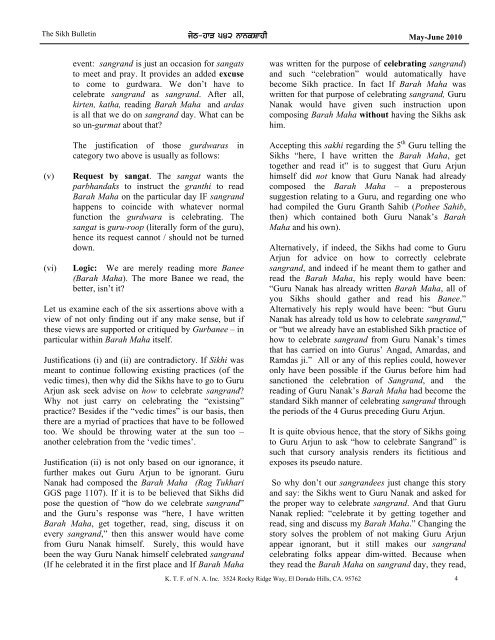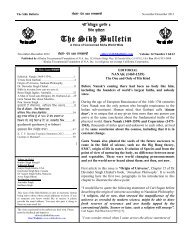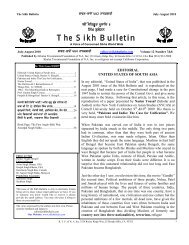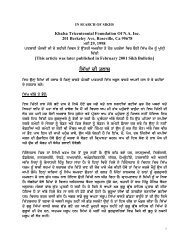You also want an ePaper? Increase the reach of your titles
YUMPU automatically turns print PDFs into web optimized ePapers that Google loves.
<strong>The</strong> <strong>Sikh</strong> <strong>Bulletin</strong> jyT-hwV 542 nwnkSwhI May-June 2010<br />
event: sangr<strong>and</strong> is just an occasion for sangats<br />
to meet <strong>and</strong> pray. It provides an added excuse<br />
to come to gurdwara. We don’t have to<br />
celebrate sangr<strong>and</strong> as sangr<strong>and</strong>. After all,<br />
kirten, katha, reading Barah Maha <strong>and</strong> ardas<br />
is all that we do on sangr<strong>and</strong> day. What can be<br />
so un-gurmat about that<br />
was written for the purpose of celebrating sangr<strong>and</strong>)<br />
<strong>and</strong> such “celebration” would automatically have<br />
become <strong>Sikh</strong> practice. In fact If Barah Maha was<br />
written for that purpose of celebrating sangr<strong>and</strong>, Guru<br />
Nanak would have given such instruction upon<br />
composing Barah Maha without having the <strong>Sikh</strong>s ask<br />
him.<br />
(v)<br />
(vi)<br />
<strong>The</strong> justification of those gurdwaras in<br />
category two above is usually as follows:<br />
Request by sangat. <strong>The</strong> sangat wants the<br />
parbh<strong>and</strong>aks to instruct the granthi to read<br />
Barah Maha on the particular day IF sangr<strong>and</strong><br />
happens to coincide with whatever normal<br />
function the gurdwara is celebrating. <strong>The</strong><br />
sangat is guru-roop (literally form of the guru),<br />
hence its request cannot / should not be turned<br />
down.<br />
Logic: We are merely reading more Banee<br />
(Barah Maha). <strong>The</strong> more Banee we read, the<br />
better, isn’t it<br />
Let us examine each of the six assertions above with a<br />
view of not only finding out if any make sense, but if<br />
these views are supported or critiqued by Gurbanee – in<br />
particular within Barah Maha itself.<br />
Justifications (i) <strong>and</strong> (ii) are contradictory. If <strong><strong>Sikh</strong>i</strong> was<br />
meant to continue following existing practices (of the<br />
vedic times), then why did the <strong>Sikh</strong>s have to go to Guru<br />
Arjun ask seek advise on how to celebrate sangr<strong>and</strong><br />
Why not just carry on celebrating the “existsing”<br />
practice Besides if the “vedic times” is our basis, then<br />
there are a myriad of practices that have to be followed<br />
too. We should be throwing water at the sun too –<br />
another celebration from the ‘vedic times’.<br />
Justification (ii) is not only based on our ignorance, it<br />
further makes out Guru Arjun to be ignorant. Guru<br />
Nanak had composed the Barah Maha (Rag Tukhari<br />
GGS page 1107). If it is to be believed that <strong>Sikh</strong>s did<br />
pose the question of “how do we celebrate sangr<strong>and</strong>”<br />
<strong>and</strong> the Guru’s response was “here, I have written<br />
Barah Maha, get together, read, sing, discuss it on<br />
every sangr<strong>and</strong>,” then this answer would have come<br />
from Guru Nanak himself. Surely, this would have<br />
been the way Guru Nanak himself celebrated sangr<strong>and</strong><br />
(If he celebrated it in the first place <strong>and</strong> If Barah Maha<br />
Accepting this sakhi regarding the 5 th Guru telling the<br />
<strong>Sikh</strong>s “here, I have written the Barah Maha, get<br />
together <strong>and</strong> read it” is to suggest that Guru Arjun<br />
himself did not know that Guru Nanak had already<br />
composed the Barah Maha – a preposterous<br />
suggestion relating to a Guru, <strong>and</strong> regarding one who<br />
had compiled the Guru Granth Sahib (Pothee Sahib,<br />
then) which contained both Guru Nanak’s Barah<br />
Maha <strong>and</strong> his own).<br />
Alternatively, if indeed, the <strong>Sikh</strong>s had come to Guru<br />
Arjun for advice on how to correctly celebrate<br />
sangr<strong>and</strong>, <strong>and</strong> indeed if he meant them to gather <strong>and</strong><br />
read the Barah Maha, his reply would have been:<br />
“Guru Nanak has already written Barah Maha, all of<br />
you <strong>Sikh</strong>s should gather <strong>and</strong> read his Banee.”<br />
Alternatively his reply would have been: “but Guru<br />
Nanak has already told us how to celebrate sangr<strong>and</strong>,”<br />
or “but we already have an established <strong>Sikh</strong> practice of<br />
how to celebrate sangr<strong>and</strong> from Guru Nanak’s times<br />
that has carried on into Gurus’ Angad, Amardas, <strong>and</strong><br />
Ramdas ji.” All or any of this replies could, however<br />
only have been possible if the Gurus before him had<br />
sanctioned the celebration of <strong>Sangr<strong>and</strong></strong>, <strong>and</strong> the<br />
reading of Guru Nanak’s Barah Maha had become the<br />
st<strong>and</strong>ard <strong>Sikh</strong> manner of celebrating sangr<strong>and</strong> through<br />
the periods of the 4 Gurus preceding Guru Arjun.<br />
It is quite obvious hence, that the story of <strong>Sikh</strong>s going<br />
to Guru Arjun to ask “how to celebrate <strong>Sangr<strong>and</strong></strong>” is<br />
such that cursory analysis renders its fictitious <strong>and</strong><br />
exposes its pseudo nature.<br />
So why don’t our sangr<strong>and</strong>ees just change this story<br />
<strong>and</strong> say: the <strong>Sikh</strong>s went to Guru Nanak <strong>and</strong> asked for<br />
the proper way to celebrate sangr<strong>and</strong>. And that Guru<br />
Nanak replied: “celebrate it by getting together <strong>and</strong><br />
read, sing <strong>and</strong> discuss my Barah Maha.” Changing the<br />
story solves the problem of not making Guru Arjun<br />
appear ignorant, but it still makes our sangr<strong>and</strong><br />
celebrating folks appear dim-witted. Because when<br />
they read the Barah Maha on sangr<strong>and</strong> day, they read,<br />
K. T. F. of N. A. Inc. 3524 Rocky Ridge Way, El Dorado Hills, CA. 95762 4
















